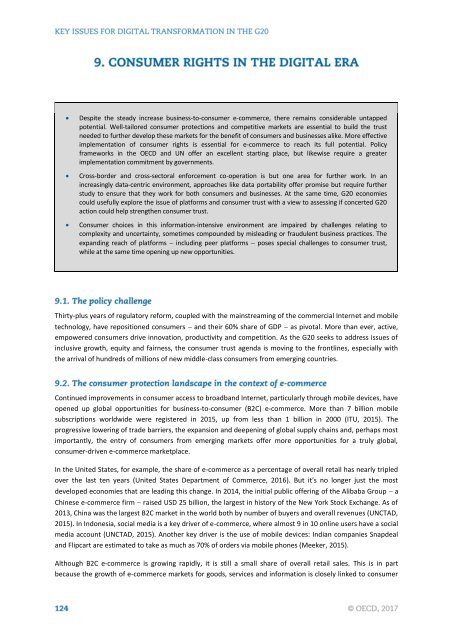KEY ISSUES FOR DIGITAL TRANSFORMATION IN THE G20
2jz0oUm
2jz0oUm
Create successful ePaper yourself
Turn your PDF publications into a flip-book with our unique Google optimized e-Paper software.
Despite the steady increase business-to-consumer e-commerce, there remains considerable untapped<br />
potential. Well-tailored consumer protections and competitive markets are essential to build the trust<br />
needed to further develop these markets for the benefit of consumers and businesses alike. More effective<br />
implementation of consumer rights is essential for e-commerce to reach its full potential. Policy<br />
frameworks in the OECD and UN offer an excellent starting place, but likewise require a greater<br />
implementation commitment by governments.<br />
Cross-border and cross-sectoral enforcement co-operation is but one area for further work. In an<br />
increasingly data-centric environment, approaches like data portability offer promise but require further<br />
study to ensure that they work for both consumers and businesses. At the same time, <strong>G20</strong> economies<br />
could usefully explore the issue of platforms and consumer trust with a view to assessing if concerted <strong>G20</strong><br />
action could help strengthen consumer trust.<br />
Consumer choices in this information-intensive environment are impaired by challenges relating to<br />
complexity and uncertainty, sometimes compounded by misleading or fraudulent business practices. The<br />
expanding reach of platforms including peer platforms poses special challenges to consumer trust,<br />
while at the same time opening up new opportunities.<br />
Thirty-plus years of regulatory reform, coupled with the mainstreaming of the commercial Internet and mobile<br />
technology, have repositioned consumers and their 60% share of GDP as pivotal. More than ever, active,<br />
empowered consumers drive innovation, productivity and competition. As the <strong>G20</strong> seeks to address issues of<br />
inclusive growth, equity and fairness, the consumer trust agenda is moving to the frontlines, especially with<br />
the arrival of hundreds of millions of new middle-class consumers from emerging countries.<br />
Continued improvements in consumer access to broadband Internet, particularly through mobile devices, have<br />
opened up global opportunities for business-to-consumer (B2C) e-commerce. More than 7 billion mobile<br />
subscriptions worldwide were registered in 2015, up from less than 1 billion in 2000 (ITU, 2015). The<br />
progressive lowering of trade barriers, the expansion and deepening of global supply chains and, perhaps most<br />
importantly, the entry of consumers from emerging markets offer more opportunities for a truly global,<br />
consumer-driven e-commerce marketplace.<br />
In the United States, for example, the share of e-commerce as a percentage of overall retail has nearly tripled<br />
over the last ten years (United States Department of Commerce, 2016). But it's no longer just the most<br />
developed economies that are leading this change. In 2014, the initial public offering of the Alibaba Group a<br />
Chinese e-commerce firm raised USD 25 billion, the largest in history of the New York Stock Exchange. As of<br />
2013, China was the largest B2C market in the world both by number of buyers and overall revenues (UNCTAD,<br />
2015). In Indonesia, social media is a key driver of e-commerce, where almost 9 in 10 online users have a social<br />
media account (UNCTAD, 2015). Another key driver is the use of mobile devices: Indian companies Snapdeal<br />
and Flipcart are estimated to take as much as 70% of orders via mobile phones (Meeker, 2015).<br />
Although B2C e-commerce is growing rapidly, it is still a small share of overall retail sales. This is in part<br />
because the growth of e-commerce markets for goods, services and information is closely linked to consumer


